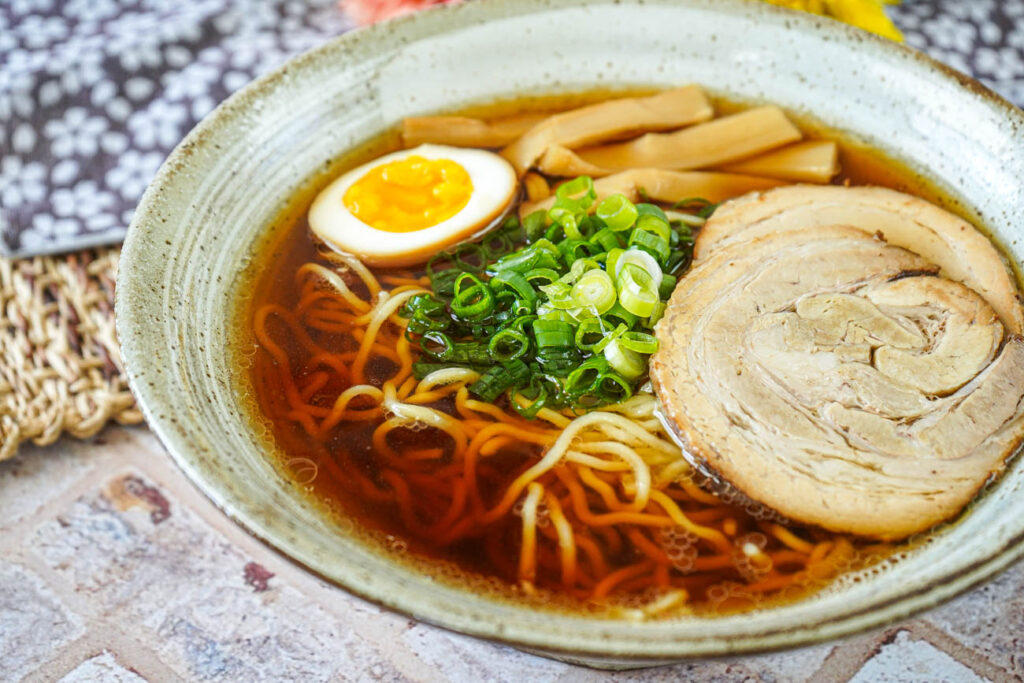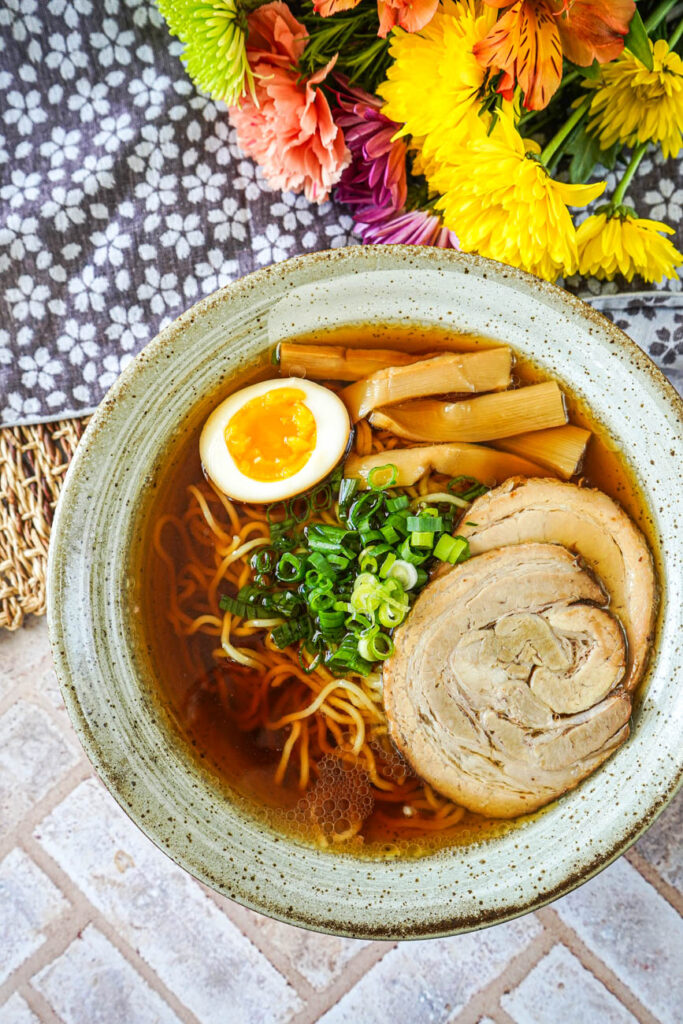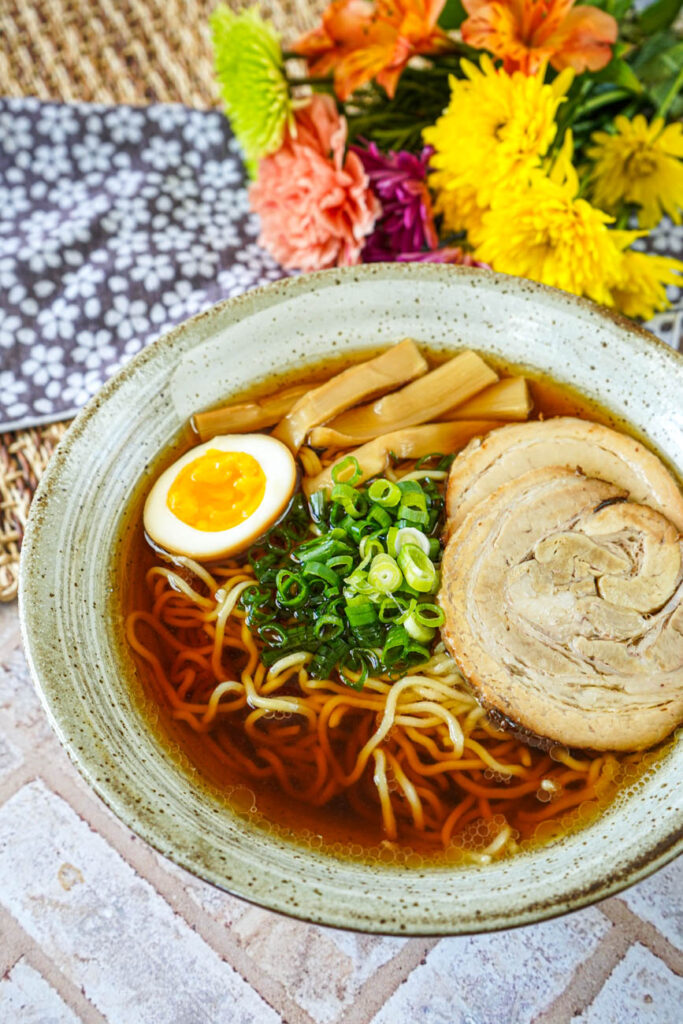Best-Ever Homemade Ramen: Secrets of a Japanese Ramen Chef, written by Shigekazu Takanashi, features an incredible collection of over 50 regional ramen recipes, garnishes, and sides developed for the home cook. A few highlights include Sapporo Miso Ramen, Chilled Ramen, Iejiro Mazesoba, Nagasaki Chanpon Ramen, and Kyoto Ramen. I will also be sharing his recipe for Fastest-Ever Homemade Shoyu Ramen following the review.
Disclosure: I received this book from Tuttle Publishing in exchange for my honest review. All opinions and statements are my own.
Best-Ever Homemade Ramen was originally published in Japanese under the name, Gokujyou no Ouchi Ramen, in 2021. It was translated into English by Makiko Itoh.

Shigekazu Takanashi
Shigekazu Takanashi is the owner of Ramen Rotas (ラーメンろたす), a ramen shop based in Shizuoka Prefecture, Japan.
He also has a YouTube channel with almost 300,000 subscribers and offers make-at-home ramen kits through his online shop to share his love of ramen with others.
Best-Ever Homemade Ramen

Takanashi begins Best-Ever Homemade Ramen with an introduction and a few tips to help you get started.
Beginners will appreciate the visual, labeled guides for notable kitchen equipment and pantry staples. There are also detailed descriptions of the types of ramen noodles and the components that make up the foundation for ramen.
Chapters are divided according to the following: Best-Ever Homemade Shoyu Ramen; Essential Recipes; Special Occasion Homemade Ramen; Infinite Impact: Iejiro Ramen; Homemade Regional Ramen; and Sides, Snacks and Staff Meal Secrets. The contents page has a list of included recipes with page number for easy reference.
Every recipe is paired with at least one photo of the finished dish. There are also quite a few step-by-step pictures to demonstrate specific foundation recipes such as creating a variety of homemade broths and making an All-Purpose Shoyu Tare.
Measurements are listed in US Customary and Metric. Titles are written in English or Romanized Japanese. Each recipe has a short headnote with background information, yield (usually 1), and helpful tips.
Fastest-Ever Homemade Shoyu Ramen

My son developed a love for ramen during our time in Torrance and that love continued to grow after our latest visit to Japan over the summer. He assisted in making all the recipes we have tried so far and particularly enjoyed the basic, but flavorful Fastest-Ever Homemade Shoyu Ramen.
This ramen is perfect for beginners with store-bought ingredients/seasonings as the base and minimal prep.
Start by placing the soy sauce, stock granules, and dashi powder in a heat-safe large bowl, then pour in just boiled water. Follow with the lard and the soup stock paste before finishing with the tender noodles and toppings.
Serve the Fastest-Ever Homemade Shoyu Ramen immediately after assembling while still hot.
Notable Ingredients
For the chicken stock granules, it is recommended to use a brand that does not have Western-style herbs.
The marinated eggs (味付け玉子, Ajitsuke Tamago or Ajitama) can be found in the refrigerated section of Japanese markets. We actually used the recipe for Marinated Jammy Eggs in the book for the egg half in the photo since we had a couple leftover from another ramen.
The soy sauce in the recipe is labeled as dark soy sauce. Not to be confused with the southeast Asian dark soy sauce, Japanese dark soy sauce (Koikuchi Shoyu, 濃口醤油) is called dark to distinguish it from the usukuchi/light soy sauce used in soups or dishes that require a lighter color. Koikuchi Shoyu is made with equal parts soy bean and wheat and is the most common soy sauce used in Japanese cooking.
Curly Ramen Noodles are thin with a curvy texture perfect for pairing with a variety of broths. Use fresh if possible. As a substitute, they can be swapped with thin wonton noodles.
Dashi stock granules (粉末だし, Dashi Powder) is a powdered version of the Japanese seaweed-based stock. It can be found in the pantry section of markets with Japanese ingredients.
Chashu (チャーシュー) is a variation of the Chinese Char Siu. Pork belly is slowly braised in a soy sauce-based mixture and aromatics until tender. I used store-bought in this recipe, but Takanashi also has recipes for Pork Belly Chashu and Lazy Chicken Chashu in the book.
Menma (メンマ) are seasoned, fermented bamboo shoots and a popular topping for ramen. The crunchy texture contrasts wonderfully with the chewy noodles. If unavailable, Just One Cookbook has a Quick Menma Recipe.
For those in Northern Virginia, I have been able to find all of these ingredients at Marufuji in Vienna. While living in Torrance, I would usually go to Mitsuwa or Tokyo Central.
More Ramen

We also made the Abura Soba, Takeoka Ramen, Dandan Noodles, and Green Onion and Chashu with Rice.
The Abura Soba is a variation of ramen made without the soup! In this version, thick ramen noodles are coated in a flavorful sauce, then topped with chashu, green onions, menma, ichimi togarashi, grated garlic, and a marinated jammy egg to finish.
Takeoka Ramen is a regional dish from the Chiba Prefecture. This ramen is unique with its use of the noodle cooking water paired with the shoyu tare and lard instead of a separate broth. To finish, the noodles are topped with minced onion, chashu, menma, and nori.
The Dandan Noodles are perfect for those wanting a bit of heat. Fresh, thin ramen noodles are served in a broth with la-yu chili oil, onion, green onion, and spicy pork.
Along with the variety of ramen, Takanashi has also included a few accompaniments and staff meals to use up extra ingredients. I really enjoyed the Green Onion and Chashu with Rice. This dish comes together in minutes using simply sliced green onions, chashu, and seasonings.

Best-Ever Homemade Ramen is a fantastic pick for those interested in making ramen at home. Takanashi has put together this book with beginners in mind, using time saving tips to create the maximum amount of flavor with the minimal amount of prep. I especially love the focus on regional variations and learned so much reading/cooking through all the recipes.
Having a market with Japanese ingredients nearby will be helpful in locating items such as the various types of ramen noodles, dried anchovies, kombu, katsuobushi, miso, ichimi/shichimi togarashi, fish cakes, and mizuna.
Fastest-Ever Homemade Shoyu Ramen Recipe
Excerpt from Best-Ever Homemade Ramen
Fastest-Ever Homemade Shoyu Ramen
Ingredients
- 1 hank fresh curly ramen noodles 4-5 ounces (130 grams)
For the Soup:
- 2 tablespoons soy sauce Koikuchi Shoyu
- 1 teaspoon chicken stock granules
- 1/2 teaspoon scallop stock granules
- 1/2 teaspoon dashi stock granules
- 1 teaspoon lard
- 1/3 teaspoon Chinese soup stock paste
- 1 1/4 cups (300 milliliters) water
For the Toppings:
- 2 slices chashu store-bought
- 1/2 store-bought marinated egg or regular boiled egg
- 5 strips fermented bamboo shoot (menma)
- 1 tablespoon sliced green onion
Instructions
- Combine the soy sauce, chicken stock granules, scallop stock granules and dashi stock granules in a serving bowl.
- Bring the 1 1/4 cups water to a boil and add to the (heat-safe) bowl.
- Add the lard and stock paste to the bowl and stir to dissolve.
- Cook the noodles in plenty of boiling water following package directions. Drain and add to the bowl.
- Garnish with the toppings.



Leave a Reply